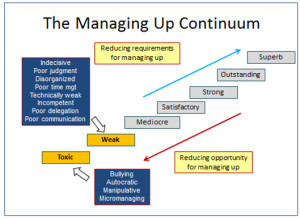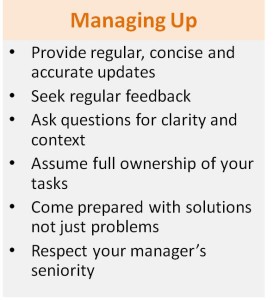If you’re a basketball fan then you’ll likely remember what occurred on May 7, 2014. On that day, current ESPN NBA Analyst Mark Jackson was let go as Head Coach of the Golden State Warriors despite producing a 121-109 record and back to back playoff appearances for the franchise for the first time since 1990-1992. Mark had shown an ability to connect with his players and get the club to play defense (which had been a foreign word before his arrival) and in a business which is measured by results, Jackson had clearly demonstrated he could deliver them.
So if the results were there and the trust with his team on the court was sound, why on earth would a change be made? Warriors Owner Joe Lacob answered that question during the team’s press conference that day and while it might not have been a popular response, his words spoke to a situation that every single one of us in the broadcasting business face each day, yet likely forget. Lacob was quoted as saying the following:
“Managing down, managing to his players, obviously a pretty good job. Most of his players seemed to really like playing for him. They played hard for him. Which is really important in the NBA. I think if you asked him, I think he would realize–maybe give him some time to answer this–that he probably could do a little better job of managing up and sideways, is the way to put it.”
Let that sink in for a second. Jackson in the opinion of the owner had delivered on the court and with the people he’s responsible for managing but he hadn’t built a connection with the one individual who signs his paycheck and ultimately helps decide his coaching fate.
 Now I’m not raising this point to suggest you should find out the number of your CEO and call him or her tomorrow and I’m not telling you that campaigning outside of your PD or GM’s door is a good idea either. I’m also not suggesting you should start offering up silly compliments or do things out of character which will cause others internally to refer to you going forward as “the ass kisser”. The point here is to help you think for a second of how “managing up” applies to you and your position and which people inside your organization you need to spend time with the most so you can do your job better, earn bigger responsibilities and make your life easier.
Now I’m not raising this point to suggest you should find out the number of your CEO and call him or her tomorrow and I’m not telling you that campaigning outside of your PD or GM’s door is a good idea either. I’m also not suggesting you should start offering up silly compliments or do things out of character which will cause others internally to refer to you going forward as “the ass kisser”. The point here is to help you think for a second of how “managing up” applies to you and your position and which people inside your organization you need to spend time with the most so you can do your job better, earn bigger responsibilities and make your life easier.
For example, how many times as a Board Operator or Producer do you forget to ask your PD for feedback on a topic you built, a feature you tried out or a slick piece of production you created? Do you really think your PD is watching how you ride your levels on the board when you’re taking a show into a break? Do they know every phone call or email you send to land a guest when you produce a talk show? Here let me answer that – NO! They trust that the training they’ve put you through and the feedback they’ve given to you is going to help you do the job the right way.
How many times as a salesperson do you forget to share a good or bad piece of feedback from a meeting you had with a prospective client with your Sales Manager, PD or GM? Heck you’re out there trying to get someone to invest in your sales story, don’t you think the people inside your own building want to hear why it did or didn’t work and offer you some feedback? Take it one step further, how often do you go through your sales pitch with a peer? If you can get them excited about your presentation, doesn’t that make you feel more relaxed and confident when you get in front of a new business or ad agency? If done well they’re likely talking in the halls to others about how good your presentation is and how they plan to copy parts of it to help them with a similar situation.
 And it’s not just on those levels either! Promotions Directors, do you take the time to tell your story to your PD, Sales Manager, GM or anyone who will listen when you create a great promotion or an on the street event? Are you sending out a photo or video recap of your promotions to let everyone in the organization see and feel that something exciting is happening and you’re the one behind it? Do you think most inside your building know the lengths of what you go through to make the radio station fun? Most of the time they see you as the middle person blocking them to the PD or Sales Manager or they think you just coordinate putting the street team at a public location. Is that their fault or yours for not understanding how you benefit the brand?
And it’s not just on those levels either! Promotions Directors, do you take the time to tell your story to your PD, Sales Manager, GM or anyone who will listen when you create a great promotion or an on the street event? Are you sending out a photo or video recap of your promotions to let everyone in the organization see and feel that something exciting is happening and you’re the one behind it? Do you think most inside your building know the lengths of what you go through to make the radio station fun? Most of the time they see you as the middle person blocking them to the PD or Sales Manager or they think you just coordinate putting the street team at a public location. Is that their fault or yours for not understanding how you benefit the brand?
Maybe you’re buried in the production room creating all sorts of cool imaging that jumps through the speakers and brings the radio station to life yet nobody has an idea that you’re the mastermind behind it because they never see your face or your name in their inbox.
The bottom line, this is something we all face on a regular basis and whether we like it or not, managing up is always a part of the game. Whether it’s GM to CEO, PD to GM, Sales Rep to Sales Manager, Producer to Host or any other position inside your organization, you’ve always got to share your story because otherwise you run the risk of people not knowing how valuable you are or even worse, they tell the story for you and that’s never a good thing.
 Let me share a quick personal experience of when I learned how important managing up is. 10 years ago (yes I’m old, I’m aware) I produced the show GameNight on ESPN Radio and I was having a blast working with John Seibel, Doug Gottlieb, Freddie Coleman, Sean Salisbury, and the countless other guys we’d have step in across the country. While we were doing some fantastic shows, the reality is that we were on the air 7 nights per week from 7p-1a EST and most bosses at ESPN were likely home with their families or at work and wishing they didn’t have to be. That’s not to say we didn’t have some great people paying attention because we did but the amount of attention paid to GameNight versus Mike and Mike or the Dan Patrick Show was very different and rightfully so.
Let me share a quick personal experience of when I learned how important managing up is. 10 years ago (yes I’m old, I’m aware) I produced the show GameNight on ESPN Radio and I was having a blast working with John Seibel, Doug Gottlieb, Freddie Coleman, Sean Salisbury, and the countless other guys we’d have step in across the country. While we were doing some fantastic shows, the reality is that we were on the air 7 nights per week from 7p-1a EST and most bosses at ESPN were likely home with their families or at work and wishing they didn’t have to be. That’s not to say we didn’t have some great people paying attention because we did but the amount of attention paid to GameNight versus Mike and Mike or the Dan Patrick Show was very different and rightfully so.
While everyone involved with the show was focused on doing the best show we could, it dawned on me that while the content may be great we still need to let others know how we were improving. If the goal was to one day be good enough to help a show like Mike & Mike, Colin Cowherd or Dan Patrick, we were going to need to push ourselves more and ask for feedback from those who were helping coach those other 3 great shows.
I took it upon myself to start sending out a note each week to everyone involved with the show (which might have taken the crew the entire week to read) to recap some of the positives and some of the areas where we needed improvement. We’d also create an action plan for the upcoming week and go over roles for all involved with the show so we all had something to be working on to help create a great show. I’d then talk weekly with my manager Dave Zaslowsky about where I thought we were making progress and where I needed some coaching help with the crew and I’d pass along some audio examples to help support my positions. After he’d review them we’d do an aircheck session with the hosts to go over it and discuss how to get better next time on-air.
Then last but not least, when we’d introduce something new on the program or if we did something that I felt needed an extra opinion, I’d share it with our leader Bruce Gilbert to see what he thought too. As one of the best minds in the business I valued his input because I knew it would make us better and I wanted him to be aware that I cared about the show and everyone involved. When you know you have people working hard for you on every single shift it makes your job as a leader so much easier and a lot more fun and I wanted Bruce to know we were always going to be on top of things regardless of what time we were on the air.
I felt very uncomfortable reaching out at first because here I was running the night show after battling for 8 years just to get in the door at ESPN but I trusted that he’d recognize I was only trying to help us be better and as long as I didn’t bombard him with too much I felt I’d be alright. Well not only was it welcomed but it was that communication that helped our relationship develop.
In each one of these situations I was managing up. Whether it was taking a leadership role with our on-air talent, bringing in the support staff to give them feedback for how they could help the show, sharing audio with my manager to get him involved or reaching out to the top boss to gain an additional perspective. By doing so it showed everyone I was invested in the show and everyone’s growth and it showed my superiors that I was coaching my crew and always striving to get better to help us deliver a better product and hopefully better results.
 Now some people in this business may have the opinion that they don’t have time to sell their work or seek out feedback and in some cases that may be true. There are certain on-air personalities who are outstanding on the air and might not want to spend the extra time discussing or reviewing their show. Much like a professional sports team, you have to manage each personality on your roster differently.
Now some people in this business may have the opinion that they don’t have time to sell their work or seek out feedback and in some cases that may be true. There are certain on-air personalities who are outstanding on the air and might not want to spend the extra time discussing or reviewing their show. Much like a professional sports team, you have to manage each personality on your roster differently.
That being said I’ve yet to see an on-air personality deliver a 100 share in a market and I don’t know many who don’t like the idea of generating more income for themselves so in my opinion there’s always room to have conversation. I’ll tell you this, most personalities and agents certainly know how to manage up when it comes contract time so doing it during the rest of the year is not impossible.
Where I believe this really matters and makes a big difference though is for those folks inside your organization who are doing the dirty work to help the product perform. From sales to production to traffic to producing, if you’re doing good work sometimes you have to remind people of what you’re excited about and what you’d like some feedback on to get better. You’d be amazed at how valuable that little bit of time spent can benefit you in the long run. In some organizations when you fail to do those kind of little things it can create a much bigger divide, even if your results are good. If you don’t believe me just ask Mark Jackson!

Jason Barrett is the Founder and CEO of Barrett Media. The company launched in September 2015 and has provided consulting services to America’s top audio and video brands, while simultaneously covering the media industry at BarrettMedia.com, becoming a daily destination for media professionals. Prior to Barrett Media, Jason built and programmed 95.7 The Game in San Francisco, and 101 ESPN in St. Louis. He was also the first sports programmer for SportsTalk 950 in Philadelphia, which later became 97.5 The Fanatic. Barrett also led 590 The Fan KFNS in St. Louis, and ESPN 1340/1390 in Poughkeepsie, NY, and worked on-air and behind the scenes at 101.5 WPDH, WTBQ 1110AM, and WPYX 106.5. He also spent two years at ESPN Radio in Bristol, CT producing ‘The Dan Patrick Show’ and ‘GameNight’. JB can be reached on Twitter @SportsRadioPD or by email at Jason@BarrettMedia.com.



